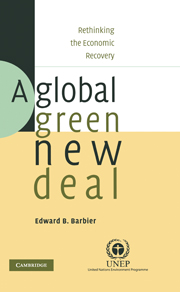Book contents
- Frontmatter
- Contents
- List of figures
- List of tables
- List of boxes
- Foreword
- Preface
- Acknowledgements
- Part I Why a Global Green New Deal?
- Part II The Key Components of a Global Green New Deal
- 2 Reducing carbon dependency
- 3 Reducing ecological scarcity
- 4 Challenges facing developing economies
- 5 National priorities for a Global Green New Deal
- Part III The Role of the International Community
- Part IV Towards a Greener World Economy
- Appendix 1 PIIE–WRI analysis of a green recovery program for the United States
- Appendix 2 Pew comparative analysis of clean energy jobs and investments in the United States, 1998–2007
- Glossary
- Index
- References
4 - Challenges facing developing economies
Published online by Cambridge University Press: 05 June 2012
- Frontmatter
- Contents
- List of figures
- List of tables
- List of boxes
- Foreword
- Preface
- Acknowledgements
- Part I Why a Global Green New Deal?
- Part II The Key Components of a Global Green New Deal
- 2 Reducing carbon dependency
- 3 Reducing ecological scarcity
- 4 Challenges facing developing economies
- 5 National priorities for a Global Green New Deal
- Part III The Role of the International Community
- Part IV Towards a Greener World Economy
- Appendix 1 PIIE–WRI analysis of a green recovery program for the United States
- Appendix 2 Pew comparative analysis of clean energy jobs and investments in the United States, 1998–2007
- Glossary
- Index
- References
Summary
The various proposed actions for reducing carbon dependency and ecological scarcity discussed in the previous two chapters pose a number of difficulties for low- and middle-income economies. This chapter reviews the main constraints.
Developing economies in particular face a number of important challenges in their efforts to move quickly to a low-carbon economic growth path, such as a lack of finance, a technology and skills gap, and uncertainty over a future global carbon market.
Access to financing is a major constraint if developing countries are expected to invest in clean and low-carbon energy alternatives. The large-scale adoption of low-carbon and clean energy technologies by rapidly developing low- and middle-income economies will be necessary over the coming decades in order to reduce their greenhouse gas emissions and improve energy security. This will require, in turn, a massive injection of capital investment. For example, for all Asian economies to reach a target of having 20 percent of their total energy supply from clean energy sources by 2020 would require capital financing of almost US$1 trillion, of which nearly US$50 billion a year would be needed until 2020. Similarly, if all developing countries honor their commitment to the International Action Programme (IAP) agreed at the 2004 International Conference for Renewable Energies in Bonn, this would mean an additional 80 gigawatts of renewable energy capacity by 2015, requiring about US$10 billion per year in investments.
- Type
- Chapter
- Information
- A Global Green New DealRethinking the Economic Recovery, pp. 159 - 168Publisher: Cambridge University PressPrint publication year: 2010



